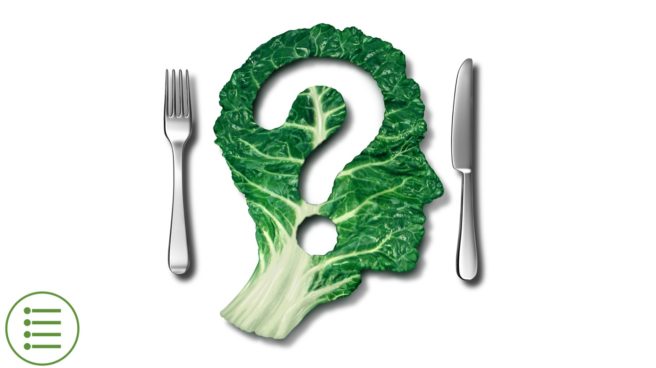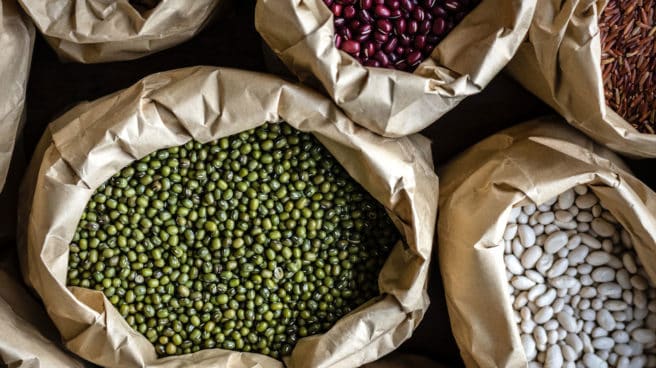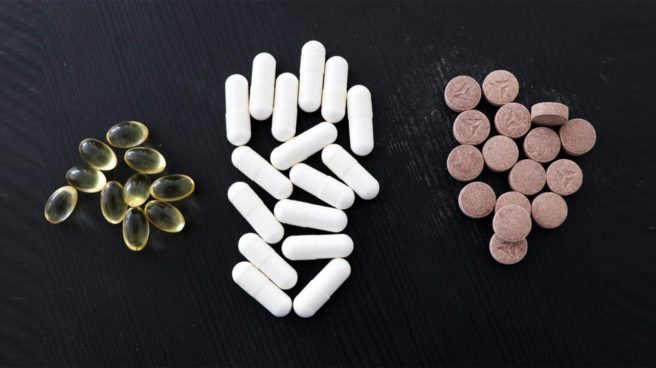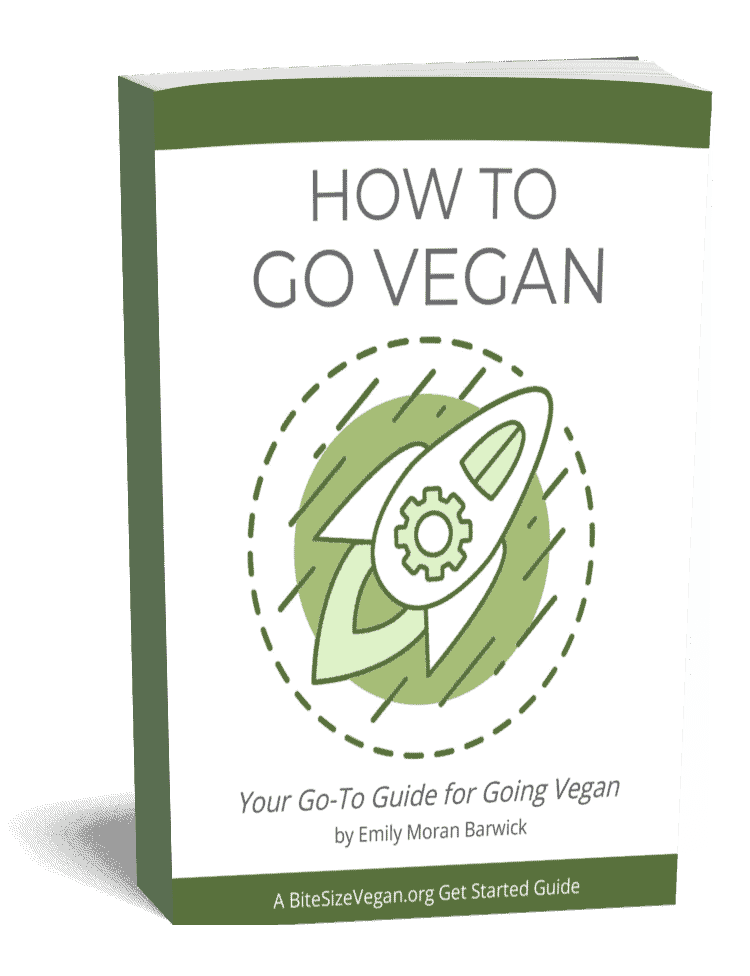Vitamin B12 is one of the most common worries for people considering a plant-based vegan diet. But this nutrient is a concern no matter what you eat! Dr. Michael Greger tells us where B12 comes from, how to get enough, and shares his supplementation recommendations.
If not for protein, vitamin B12 would probably be the nutrient vegans are asked about most often.
Where do you get vitamin B12 on a plant-based diet? Are vegans deficient? Doesn’t B12 come from meat? Do only vegans need to take a supplement?
For help answering some of the most common questions on how to get B12 on a plant-based vegan diet, I asked specialist Dr. Michael Greger of NutritionFacts.org.
Introducing Dr. Michael Greger & the Vegan Nutrition Concerns Series

Dr. Greger is a licensed general practitioner specializing in clinical nutrition, an author, and an internationally-recognized speaker on nutrition, food safety, and matters of public health.
This interview is the sixth in the Vegan Nutrition Concerns Series with Dr. Greger. This series addresses common nutrient-specific concerns related to a plant-based diet, and touches upon the health impacts of animal products.
Dr. Greger on How to Get B12 on a Plant-Based Vegan Diet
The following transcript of my interview with Dr. Greger (from the video above) is edited for clarity, order, and readability.
Do We Need to Supplement Vitamin B12?
Dr: Greger: [S]ome vegans aren’t taking their vitamin B12, which is critical.
There’s only two vitamins that one can’t get…in the produce aisle where we should get all our vitamins and minerals. One is vitamin D which we already talked about which…comes from the sun [and is] artificially added, for example, to the dairy supply.
Vitamin B12 is not made by plants [and] not made by animals either. [It’s] made by little microbes that blanket the earth. We used to get all the B12 we needed, presumably, from drinking out of well water or mountain streams. But now, chlorinated water supplies kill off bacteria, so we don’t get a lot of B12 in our water anymore. [We] don’t get a lot of cholera either—that’s a good thing!
But now…we live in a sanitized world…[and] we’re not like our primate cousins, eating bugs [or] feces all day. We’ve got to get B12 from somewhere.
How to Get Vitamin B12 & Supplement Recommendations
Dr. Greger: [T]he hygienic source, the safest source, the healthiest source, the cheapest source is vitamin B12 supplements. You can also use vitamin B12-fortified foods [including] soy milks [and] meat analogues.
But probably the simplest thing is to take one 2,500 microgram tablet of B12…the chewable [or] sublingual [variety] once a week. [It will] cost you $5 per year. [S]hare a bottle with your friends; it’s super easy, and you’ll actually have better B12 status than everybody else around you.
Everyone Must Make Sure They Get Enough Vitamin B12 (Even Meat-Eaters)
Dr. Greger: [I]t’s serious not getting enough [B12], particularly for…vegan infants…who may start out with low levels if the mom has already had low levels and [they] just go downhill from there. [M]any people who…go vegan later in life…start out with pretty high levels and so [it] may take them a while to show deficiency.
But even then, everybody needs to ensure [a] regular, reliable source of vitamin B12—and that’s including those people who eat meat. Yes, they get it from meat, but that’s not where you want to get your nutrients, right? It’s lacking in all these wonderful things we want like fiber, and has things we don’t want like the saturated [and] trans fats, cholesterol, etc.
Sublingual vs. Injected Vitamin B12 Supplements
Dr. Greger: The reason people get shots in [the United States] and sublingual everywhere else in the world is because [of] a doctor’s salary. [E]verywhere else in the world, they don’t get paid by the visit. …[If] you get shots, you have to go back and see your doctor and you have to pay them more, and you have to get your insurance to pay them more.
So, that’s the only reason, and studies [have] shown sublingual is just as effective. [F]or example…if you [a]re deficient, you can take 2,000 micrograms once a day for two weeks and basically restore your levels as good as if you had a B12 shot.
Which Type of Vitamin B12 is Best?
Dr. Greger: Cyanocobalamin is the best. It’s the cheapest, it’s the most widely available, and [it’s] convenient to get.
The vast majority of research is on cyanocobalamin. [Y]ou take vegans…who have B12 deficiencies, give them cyanocobalamin, and they get better. We don’t have similar studies with some of these other [types] and the dosages are all different; people get confused.
And if people wanted to take methyl, then you would have to take [around] 1,000 [micrograms] a day, not 2,500 once a week.
With the exception [of] people who are heavy smokers or people that subsist off of cassava or have kidney function problems, cyanocobalamin is the best, cheapest, [and] most convenient source. [I]t’s not that it’s dirt cheap, but you use literally millionths of a gram. It’s measured in micrograms. Buy the cheapest and you should be fine.
In Closing…
I hope you enjoyed hearing Dr. Greger’s take on how to get B12 on a vegan diet.
Like humans, animals do not produce enough B12; they get B12 in their diets by eating from the ground and drinking untreated water. However, our horrific farming practices—which have virtually sterilized our soil—and our water purification practices have left even farmed animals unable to get adequate B12. Some farmers actually give farmed animals B12 shots or supplement their feed in order to market their products as sources of B12.
While we all generate our own B12 to a small degree, it is not in sufficient amounts. B12 deficiency is a humanity-induced problem, not a vegan problem.
Dr. Greger’s Vitamin B12 Recommendations
- At least 2,500 mcg (µg) cyanocobalamin once each week, ideally as a chewable, sublingual, or liquid supplement taken on an empty stomach
- or at least 50 mcg daily of supplemental cyanocobalamin (you needn’t worry about taking too much)
- or servings of B12-fortified foods three times daily (at each meal), each containing at least 190% of the Daily Value listed on the nutrition facts label (based on the new labeling mandated to start January 1, 2020—the target is 4.5 mcg three times a day).
- Those over 65 years of age should take at least 1,000 mcg (µg) cyanocobalamin every day.
- Tip: If experiencing deficiency symptoms, the best test is a urine MMA (not serum B12 level)
Now I’d love to hear from you: Where do you get your B12? Do you supplement? Have your levels been tested? Let me know in the comments!
— Emily Moran Barwick
Get Started
Please note that when it comes to your health and nutrition, there is no substitute for the guidance of a trained medical professional, especially if you have any medical conditions or complications.
Finding a plant-based provider can be challenging, depending on your location and health insurance (or lack thereof). In the accordion below are online directories for plant-based providers. I hope to expand the list to include ones that serve more countries. If you know of any additional directories, please let me know!
Plant-based medical provider directories
Please note: in listing these directories, I am not recommending or endorsing them or any health care providers listed within them.
- The Physicians Committee for Responsible Medicine (PCRM) (Worldwide)
- Plantrician Providers (U.S.)
- Plant-Based Health Professionals (UK)
- Plant-Based Canada (Canada)
- Vegan Friendly Registered Dietitians (Worldwide – telehealth) from Challenge22
Do you know of other directories? Especially ones serving more parts of the world? Please let me know!
MORE FROM THE VEGAN NUTRITION CONCERNS SERIES:
- The Crime Of Raising Vegan Kids | When Diet Is Deadly
- How NOT To DIE: Foods That Add Years | Dr. Michael Greger
- Deadly Nutrition: The REAL Dietary Killers | Dr. Michael Greger
- How to Get Carnitine, Carnosine & Creatine on a Vegan Diet | Dr. Michael Greger of Nutritionfacts.org
- How to Get Iodine on a Plant-Based Vegan Diet | Dr. Michael Greger of Nutritionfacts.org
- How to Get Zinc on a Plant-Based Vegan Diet | Dr. Michael Greger of Nutritionfacts.org
- How to Get Vitamin D on a Plant-Based Vegan Diet | Dr. Michael Greger of Nutritionfacts.org
- How to Get Iron on a Plant-Based Vegan Diet | Dr. Michael Greger of NutritionFacts.org
- How to Get Calcium on a Plant-Based Vegan Diet | Dr. Michael Greger of Nutritionfacts.org
- How to Get Omega-3 on a Plant-Based Vegan Diet | Dr. Michael Greger of Nutritionfacts.org







VegLife is a vegan multiple and has B12.
I get it at The Vitamin Shoppe. Whole Foods also has it but I am protesting them for selling rabbit meat.
Super video combining the best of Dr. G. and Emily’s “outro” with important big picture stuff :-)
Just to share my own experience, uses, and favorite products in followup to Sally’s comments:
For those looking for a purely B12 (not a multi-vitamin containing it) I’ve use Freeda brand, chewables, very affordable, available through vegan essentials. Very few other ingredietns other than B12 (list of ingredients is on VeganEssentials site) and is a vegan formulation.
I also like Freeda for being more than vegan, the pretty minimal number of ingredients. Most vitamin pills, mainstream kind, smell funny, from the distant past memories I have and from rare times I am near someone who uses the ‘regular’ kind… I use the Freeda Calcium/Magnesium pills too and they are so pure, that someone like me who cannot swallow even tiny pills, can just chew them, and have a glass of juice, they have basically no taste at all, very pure ingredients. I hope they same thing doesn’t happen to them that is so common: buy-out by some huge corporate machine that then messes with a good formulation to make it “Better” (more profits) by corrupting it…I hope they are around for many years.
I use the calcium/mag irregularly, much less than 100% per day, maybe adding 16% (1 pill every two days) out of 1000mg but Greger notes that we need only 600 mg so I’m getting close to 25% of my actual needs, and try to get rest from food sources..sometimes I have more often like 1 pill a day but I try to get from whole plant sources…
But the b12 freeda I try to use close to Greger’s recommendations
I’m a bit surprised (and dismayed) that Dr. Greger made a blanket statement about which form of B12 was best to take, without addressing people who have an MTHFR gene mutation, for whom the methylated form of B12 (and folate, by the way) can make all the difference. Please do some research on this, as it is not by any means a rare thing – it affects a significant percentage of people, most of whom are likely unaware of it (personally, I am heterozygous for the MTHFR C677T mutation, which my naturopath suspected because of my glutathione deficiency and other health issues, and had me tested for it).
Here is one webpage you may find helpful: https://doccarnahan.blogspot.com/2013/05/mthfr-gene-mutation-whats-big-deal.html
I’m hoping to see a video devoted to the methylation-challenged! Thanks, Emily!
i’ve done a lot of research on MTHFR myself, Debbie, as I have several mutations in relation to it- my genetics “say” hydroxycobalamin is the one for me…unfortunately the MTHFR is still barely understood by physicians. i think it’s going to take some time
Aha! A fellow mutant – I knew it! :)
I agree, Emily – it’s not really on their radar, though it should be. But there’s one way to fix that, and who better to bring it to Dr. Greger’s attention than you? He doesn’t know me from Eve, but I think he might be receptive to your input. In regard to B12 supplementation, there isn’t a one-size-fits-all solution, and it shouldn’t be treated that way (as you well know). Thanks, Emily!
that’s why i asked him the genetic question but unfortunately our time was very limited so i wasn’t able to go into it much :( hopefully i can find some time with him again in the future ;)
I found a natural plant-based b12 supplement made from couch grass root online (Sidea B12). It says on their website that it is suitable as a supplement for vegans – any thoughts on this?
They added the B-12.
i would go with both
Cyanocobalamin and methilc.
both are the most choosen one.
sure, you can make test, go with one for a couple or months and then change it. but at the beginng, if you have deficiency. go with both.
body will be thank you.
When people ask me “where do you get you B12 from duhh?”
I reply: “From Redbull!”
Hello, thanks for the video, good information!
I wanted to ask you if you had a specific brand for the b12 because there are so many and I don’t know wich one to buy! Help please!
Hello, A friend recently introduced me to Dr. Greger’s research. I have the MTHFR mutation from both of my parents. I recently learned about this from genetic testing. I am working with a doctor who is monitoring my health and has suggested a plant based diet in addition to healthy fish and seafood as it is full of DHA. I am also taking specific B vitamins, avoiding dairy and gluten.